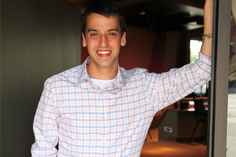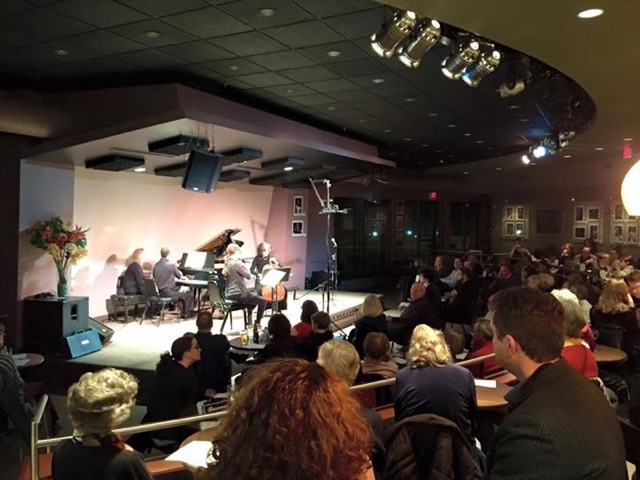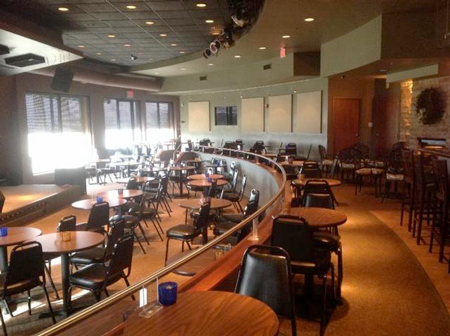by Mike Telin

He’s usually the first person to say hello when you enter the inviting venue — if he doesn’t know your name, he soon will. And by the time you leave you’ll likely know the names of most of the other audience members, as well as those of the performers. Pollack is the venue’s Sam Malone, and his friendly staff is the supporting cast. Between June 27, 2014 and September 6, 2015 Pollack welcomed nearly 8,000 “Bop Stoppers” to performances at The Music Settlement’s West Side venue.
“Tomorrow is my 200th show,” Pollack told me on a sunny fall afternoon during the rare occasion when the Hingetown neighborhood’s venue was free of activity. I congratulate him on his success, but he’s far too humble to take all of the credit. He gives most of that to the venue’s current owner, and to the forward thinking of its board and its president, Charles Lawrence. “The Settlement brings a lot to the space that I think helps accomplish the goals that I have, not the least of which is its great, 102-year-old reputation. It seems that everyone I talk to has some kind of connection to The Settlement, whether that be a family member or a friend.”
Although nearly every evening is booked with concerts of an astonishing variety of musical genres (click here for a complete calendar), during the day the venue hosts early childhood and music therapy classes. A new partnership with the Boys and Girls Club of Cleveland has recently begun. Collaborations with The Cleveland Culinary Launching Kitchen provide small-plate offerings during performances, and Cleveland Rocks: Past Present and Future keeps the venue’s walls supplied with art. All proceeds from bar sales go directly to The Settlement.
Pollack points out that he has also benefited from the BOP STOP’s rich history as a jazz club. Many still remember the venue’s first location at East 40th and St. Clair. It later moved to the corner of East 6th and Lakeside before the new state-of-the-arts facility was opened at its current Detroit Avenue location. After having sat idle for some time, the venue was donated to The Settlement in late 2013.
“There is something very special about the place,” Pollack said, gesturing across the semi-circular terraced floor-plan with its expansive windows that provide a nearly unobstructed view of Lake Erie. “It’s been a little difficult to get people to realize that we are open again, but also to get them to differentiate between what it was, and what it’s becoming. There is a bitter-sweetness to that, but I just want people to come in with no expectations. It’s no longer strictly a jazz club, but it is still very much a ‘listening room.’”
In terms of programming, Pollack describes the space as a mini-performing arts center that presents a variety of programming appealing to all demographics. “I know where my strongest connections are, and many of those are through my previous job at Nighttown. I also work with private producers to help me tap into new markets. I’ve presented a lot of Gospel and R&B, and the built-in crowd a private producer can provide helps a lot.”
When it come to the music, Pollack enjoys presenting bands and ensembles that perform original works. “It’s exciting for me to hear what musicians these days are coming up with but I always tell them to play what they are most excited about, because my audience wants to hear the music that excites the performers.”
Pollack is pleased with the way audiences have reacted to the programming changes, and how they can appreciate the diversity and mission of The Settlement. “I want people who loved the old BOP STOP to love the new version, but at the same time I am stretching people’s ears a little more — which I think is a healthy exercise.”
At first, not having table service made him a bit nervous about serving food, but audiences have reacted well to the small-plates concept. “The regulars do want to see the menu change every so often. We’ve heard them, and we’re responding.”

The Settlement’s Almeda Trio at BOP STOP
With the generous support of WCLV president and co-founder Robert Conrad, the venue recently completed phase one of upgrading and expanding its recording capabilities. “We were able to purchase new equipment — a new digital board, amps, cross-over unit, and microphones. I can now mix from an iPad from behind the bar. Now, performing artists can make archival as well as high-end, live recordings. Bob is a board member, and we’re so grateful for his support of all that we do, especially the classical music that we present.”
A native of Philadelphia, Gabe Pollack attended Oberlin College and Conservatory, earning bachelor’s degrees in Environmental Studies and Jazz Entrepreneurship. He was always interested in the business side of music, and in running a venue. Pollack first met Jim Wadsworth when Wadsworth was a guest lecturer in his jazz business class. He gave Pollack his first job out of school, although the road to that position was a circuitous one. After being turned down for a grant because he lacked professional experience, he contacted Wadsworth asking him for a job but was turned down due to budget constraints. “Oberlin had just started a new program called Creativity and Leadership, that awards small grants to fund unpaid internships. I applied and received $2,000, so I went back to Jim and told him that I could work for an arranged period of time and he wouldn’t have to pay me. I worked at Nighttown for one summer, and he hired me after the money ran out. I was there for a little over three years.”
Pollack found the idea of staying in Cleveland appealing because he knew Nighttown was a DownBeat Top 100 Club. “It’s the only one in Ohio, and I felt it was about the only top club I could get a job at right out of school. I learned so much from Jim. It was a great experience.”
With the growing energy of the city and the number of artists who were choosing to call Cleveland home, Pollack was certain a new venue would be needed to accommodate the burgeoning music scene. Then he read that the BOP STOP had been donated to The Music Settlement and that they would be posting an opening for a management position. “As part of my final project at Oberlin I created a business plan for a venue, but I never anticipated that The Settlement would play a role in it. I had tweaked that business plan to make it appropriate to the position, and brought it to the interview along with my cover-letter and resume. The concept was pretty well thought-out, and I guess it impressed them.”
Concluding our conversation I asked Pollack to describe the new BOP STOP in thirty seconds. He didn’t miss a beat. “It’s Cleveland’s premier education and performance venue that holds early-childhood classes during the day, and at night we run the space as a club. All proceeds from the bar go directly to the operating budget of The Settlement. We have strategic partnerships with a cooking school to provide us with light food during the shows, and an art gallery to make sure that the space looks intriguing.” He is well prepared to give his elevator speech at arts conferences.
Published on ClevelandClassical.com November 5, 2015.
Click here for a printable copy of this article



